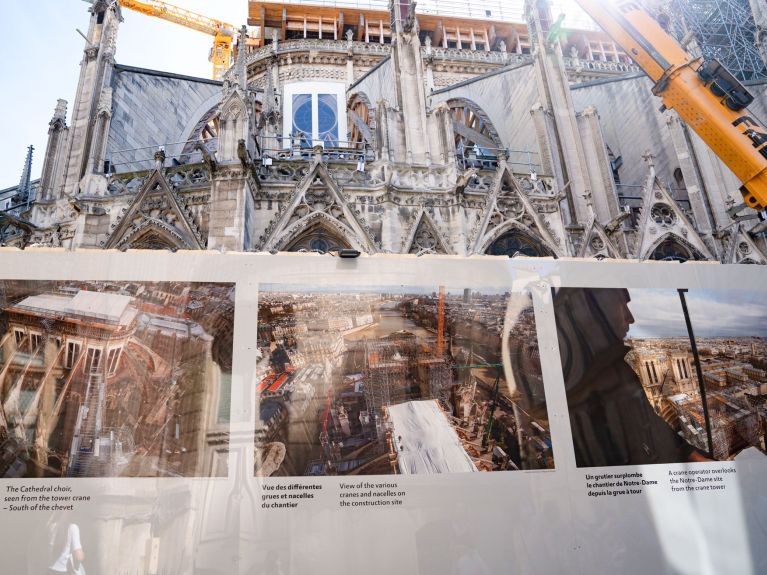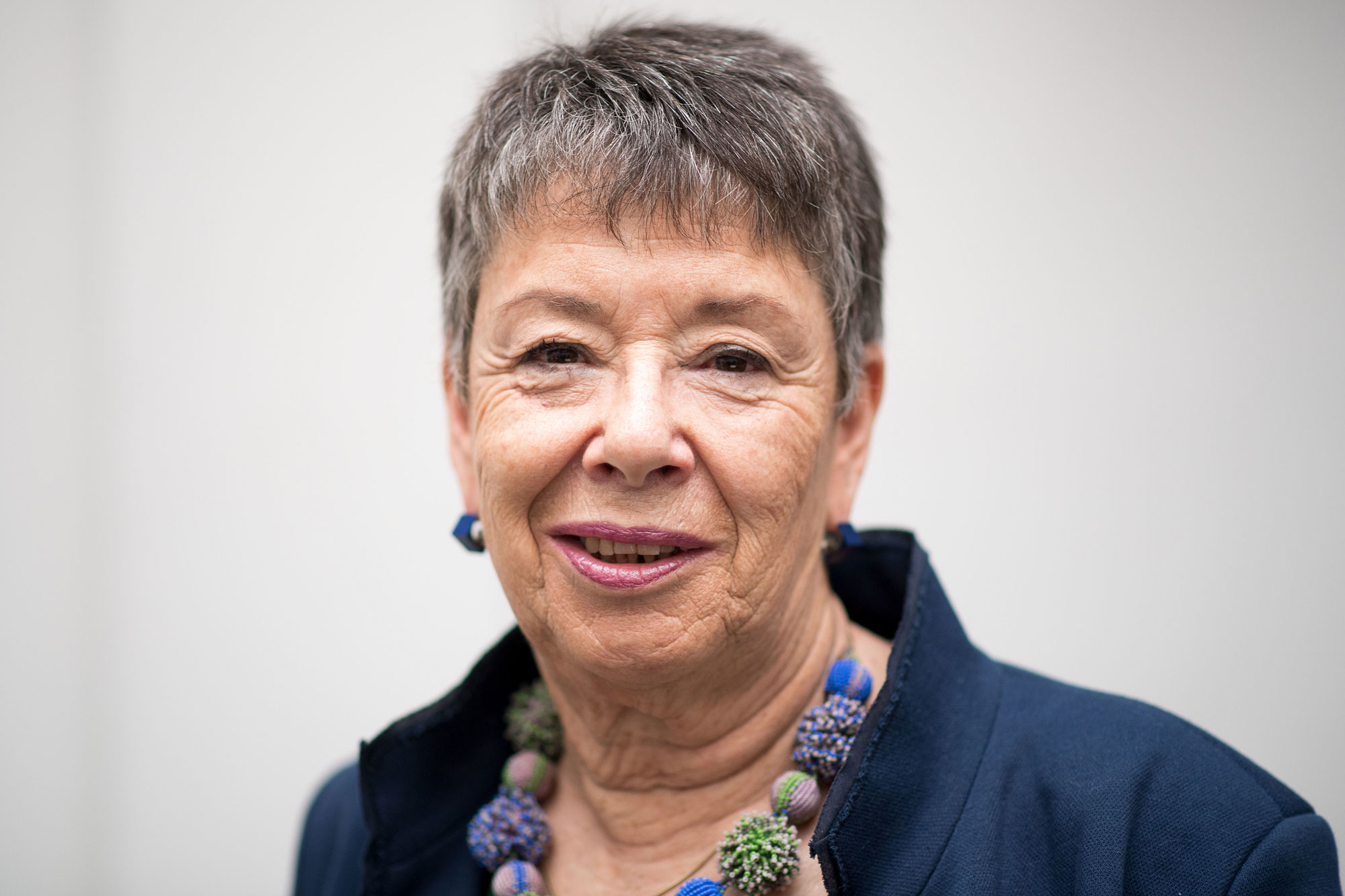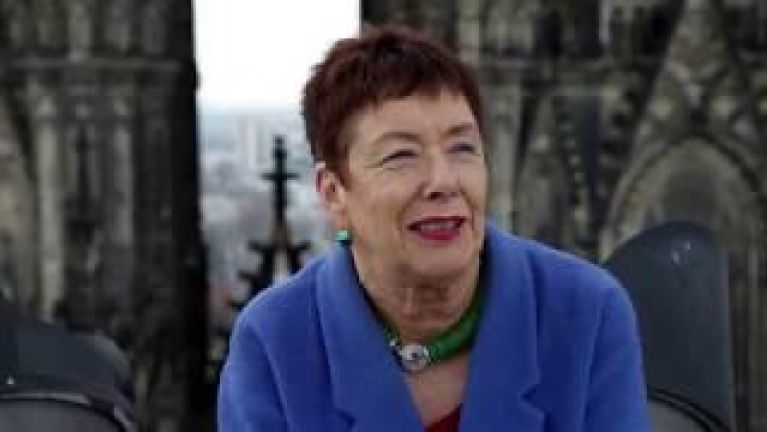“Money is not the most important thing”
Support following the disaster: Barbara Schock-Werner is coordinating Germany’s assistance with the rebuilding of Notre-Dame.

As a former Cologne cathedral master builder, Barbara Schock-Werner’s knowledge of historic church buildings is matched by only a handful of other experts in Germany. So it was natural for this experienced architect and monument conservationist to be chosen when someone was needed, following the devastating fire at Notre-Dame Cathedral in Paris, to coordinate the many offers of help from Germany.

Ms Schock-Werner, what did you think when you saw the TV pictures of Notre-Dame cathedral on fire in April 2019?
I thought: “It can’t be true, it can’t really be happening.” I was completely appalled because I was well able to imagine what the fire meant for the building and for my conservationist colleagues there.
Did you immediately feel that you could contribute to the rebuilding of the cathedral?
No, that came three days later when I received a phone call from the office of Monika Grütters, Germany’s federal government commissioner for culture and the media. I was told that there were so many offers of support with the building process from Germany that someone was urgently needed to coordinate everything. And because I always welcome a new challenge, I said yes.
What is your job?
First of all I gathered together all the offers of help and replied to all the letters. Naturally I first needed to comfort people. The fire caught France completely off-guard – what was needed before anything else was an organisation that could handle the rebuilding.
Because I always welcome a new challenge, I said yes.
Which offers of help were received?
All kinds. A German crane manufacturer offered to provide equipment for the building site. That is something that actually happened. The prospect of donations of wood was raised, and individual carpenters offered to work on the project. Somebody wanted to rebuild the cathedral’s roof using a 3D printer, while someone else wanted to use the burnt timber to create a sculpture. This is conceivable, but certainly not the most urgent thing just now.
Besides offers of practical help, Germany also showed a great willingness to donate money.
The account of the German Commission for UNESCO currently shows a balance of around 460,000 euros. The Kölner Dombauverein (i.e. Cologne Cathedral Building Society) has also raised funds that now amount to 220,000 euros. Money was donated by individuals, church communities, businesses. That said, France has received hundreds of millions of euros in donations, so money is not the most important thing. I agreed with everyone involved that donations should be tied to a concrete offer of help.
Dieses YouTube-Video kann in einem neuen Tab abgespielt werden
YouTube öffnenThird party content
We use YouTube to embed content that may collect data about your activity. Please review the details and accept the service to see this content.
Open consent formWhat kind of offer was that?
The people in charge in France had the cathedral’s glass windows taken out so they could be cleaned and restored. Because three specialist cathedral building firms in Germany have glass workshops, I thought it would be useful if we handled part of the glass restoration. At first it was difficult to reach agreement, however, because no clear responsibilities had been defined.
And then the corona pandemic happened.
Exactly. Straight after the fire I went to Paris three times and visited the cathedral and the workshops of the French conservationists, but then it became impossible to travel. A lot can be done by video calls, but not everything. All the same, we managed to agree that four or five of the windows, each of which measures roughly 72 square metres, would be restored in Germany. Work will probably not begin until early 2021, however, because our colleagues in Paris are still busy securing them and dealing with other acute challenges.
The stone masons at the specialist cathedral building firms in Germany could certainly help.
In which areas besides glass restoration does Germany have special expertise?
The stone masons at the specialist cathedral building firms could certainly help, but it is not yet clear whether the cathedral’s vaults will actually have to be replaced. This will depend on whether they were exposed to such high temperatures that they can no longer bear the required loads. Extensive investigations still need to be conducted to ascertain this. If necessary, German stone masons could come to Paris, or some of the stone material could be produced here using templates. It is also possible that we could help clean the organ; it needs to be fully dismantled and cleaned because there is lead dust in the pipes.
It sounds as if a great deal of patience were needed.
Many people imagine that a church of this kind can simply be rebuilt from one day to the next. Naturally that is not the case. My French colleague told me that it will take ten years before even the stones are completely dry again. And because water from the River Seine was used to extinguish the fire, a certain amount of dirt penetrated the walls and will need to be removed.
Could the rebuilding of Notre-Dame strengthen Franco-German cooperation in the preservation of monuments long-term?
Philippe Villeneuve, France’s chief architect for historical buildings, attended this year’s cathedral master builders’ conference in Basel. Notre-Dame does not have its own cathedral building workshop as yet – he was greatly interested in establishing such an institution and drawing in this context on German know-how. Thus the disaster could also give rise to some good.



